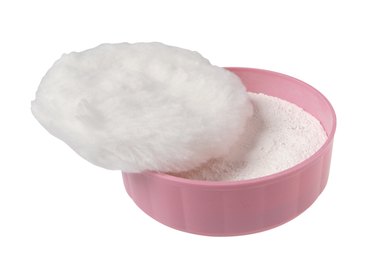
Water is one of the world's best-known solvents. Powders, which are fine solids, tend to be insoluble or partially soluble in water. The level of insolubility of powders in water varies depending on a number of adjustable factors, such as temperature, humidity and particle size. The insolubility of certain powders in water is an important consideration in their practical applications. A number of commonly used powders are insoluble or only slightly soluble in water, such as starch, zinc oxide, certain household cleaning powders and certain antibiotic and medicinal preparations.
Solubility
Video of the Day
The solubility of a substance is the extent to which it dissolves in another substance. The substance being dissolved is called a solute, and the substance into which it's being dissolved is called a solvent. The combination of solute and solvent is called a solution. The solubility of a substance is a measure of the maximum amount of that substance that can be dissolved in a solute until an equilibrium level is attained. An insoluble substance, such as a powder, either doesn't dissolve in a solute or dissolves in miniscule quantities.
Video of the Day
Powder
Powders are composed of small particles of solids: The particle size can range from being relatively large and coarse to being minute and fine. The particles can be crystalline, in which case the powder tends to have a sheen. If they're not crystalline, the powder tends to have a flat, matte color and texture. The particle size is important to powder solubility, with larger particles generally being more insoluble in water. If you decrease the size of the particles, such as by grinding the powder with a pestle and mortar, you can sometimes increase the solubility of the powder.
Factors
A number of factors have an effect on the degree of solubility of a powder in water. Temperature, the pH level, humidity, the size and structure of the molecules that make up the powder, and the polarity are all important considerations when it comes to insoluble powders. Generally, powders tend to become more soluble in water at higher temperatures. More specifically, the solubility of a powder in water decreases with the temperature if the process is exothermic, or releases energy. Water is a polar solvent, meaning that its electron density is uneven. Nonpolar powders are insoluble in water. Powders composed of large molecules are insoluble in water due to their larger particle size.
Considerations
Powders that are insoluble in water may be soluble in other solvents. This is especially important for insoluble powders that find uses in medicine and the cosmetic industries. Powders are compressed into tablets for medication, dispersed into creams or lotions, and incorporated into items used for sun protection and household cleaning. Powders are also heavily used in the food industry.